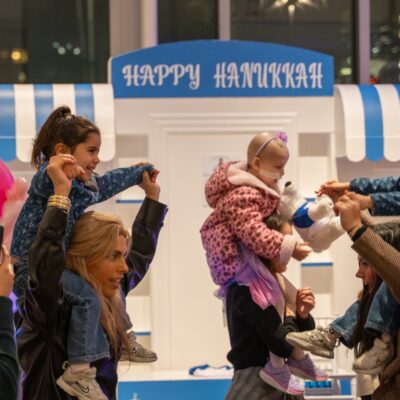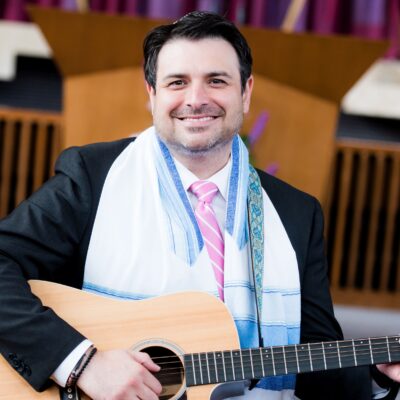Opinion
FEELING TORN
Jewish women, the vibe shift and how we step back into building a just world
Jewish women who hold progressive values close while also maintaining a steadfast commitment to fighting antisemitism find ourselves at a crossroads. This dual allegiance often places us in a world of contradictions, especially when political leaders and movements present conflicting stances. During his first term, President Donald Trump’s policies on immigration, women’s rights, healthcare and international relations were key flashpoints for a large number of Jewish women. Many opposed his approach to reproductive rights, his equivocation in the wake of violent clashes in Charlottesville and his rhetoric and actions toward Muslims and immigrants. In response, Jewish women turned to progressive causes in large numbers, aligning with the Women’s March, Black Lives Matter and other left-leaning activist organizations despite troubling instances of antisemitism and anti-Zionism from movement leaders.
Since the Oct. 7, 2023 attacks on Israel by Hamas, these instances can no longer be ignored. While Jewish women overwhelmingly supported Vice President Kamala Harris in the 2024 U.S. Presidential election, some polling indicates an increase in Jewish Republican support due to the far left’s response to the Israel-Hamas war and its handling of the rise in antisemitism across the U.S. Plainly stated, many Jewish women will continue to have difficulties aligning with movements and organizations that have been openly critical or even hostile to Israel’s right to exist.
This is bad news for everyone.
It is bad news for Jewish women, who face a lonely four years. Many feel less comfortable in progressive spaces despite our traditional support of core issues like reproductive rights and immigrant rights.
But it is worse for progressive organizations. Their overreach on issues outside of their core focus areas has marginalized them from broad-based support at a time when that support is most needed.
And it is even worse, tragically so, for vulnerable human beings — poor women, immigrants, members of the LGBQT community and others — who need these organizations to function at high velocity. The mission creep, chaos and work avoidance at large numbers of progressive organizations do not bode well for their effectiveness in doing the work they are entrusted to do.
Where do we — the majority of Jewish women who won’t stand for antisemitism but who also support progressive issues — go from here?

First, we must hold organizations doing critically important work accountable by insisting that they stay focused. One way to accelerate progress is to encourage organizations, like some universities, to adopt a stance of institutional neutrality on issues outside of their core missions. There is little strategic or pragmatic basis for a domestically focused legal services organization to communicate its stance on a political issue on the other side of the world. Furthermore, this mission creep and the divisiveness it creates should not be tolerated by contributors or by organizational leaders.
For some Jewish women, this may be insufficient. It is impossible to unsee the hatred directed at our community and Israel over these past 16 months. In particular, the continued failure of most women’s rights and human rights organizations to speak out forcefully — or in some cases, even at all — against the mass rape of Israeli women and for the return of hostages is simultaneously mystifying and enraging. The silence from these organizations as hostages remain in life-threatening conditions and, when released, are paraded and threatened under the auspices of the International Red Cross, is particularly deafening. It is not easy to support organizations while imagining their leaders might be antisemites. We must champion those who focus on their work inclusively and strategically, and continue to speak out against those who do not.
Lastly, we must remind ourselves of what is at stake: the people who are helped by social justice, international aid and social services organizations — who are decidedly not the same people as those who run them. Despite the poor choices of some organizational leaders, women still need reproductive health care; families need places to live; and people of limited means need food. We must not let our anger at ineffective leadership overwhelm our compassion for those they serve, particularly as an unstable government environment is creating chaos for many nonprofits that rely on government funding.
There are many hard lessons from Oct. 7. One of them is the stark realization that antisemitism and anti-Zionism are more widespread than some of us thought, and disappointingly so among so-called allies on the progressive left. Another, perhaps more important lesson is the reminder of who we are as a people and our responsibilities to each other and our world. The Torah teaches us repeatedly that we were slaves in Egypt. The coming months and years will require us to proceed with the dual nature of this commandment: not to forget our own vulnerability, nor that of others. Holding this core commitment of Jewish peoplehood will be a delicate balancing act — and one that will help shape our community and our world for the better.
Rabbi Joanna Samuels is the CEO of the Marlene Meyerson JCC Manhattan in New York City.

 Add EJP on Google
Add EJP on Google









